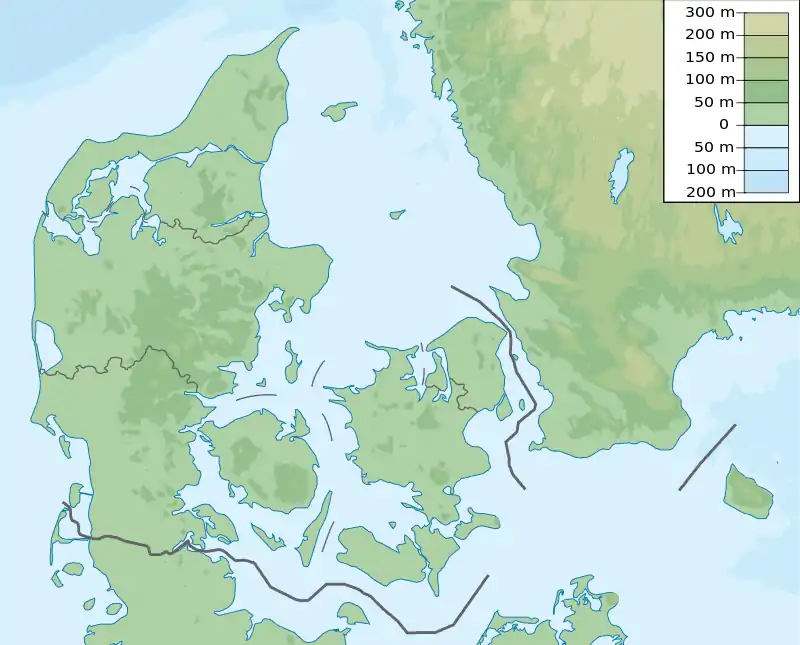Rønne Formation
The Rønne Formation is a geologic formation on the island on Bornholm, Denmark. It is of middle Hettangian to early Pliensbachian age. Vertebrate fossils have been uncovered from this formation. During the Early Jurassic, on what is now the Bornholm region was transitional between continental and marine settings with tidal influence.[1] There was a lower delta plain, with lagoons and intertidal swamps.[2] The formation is correlated with the lower Rya Formation and the upper Höganäs Formation of Skåne, Sweden.[3]
| Rønne Formation Stratigraphic range: Mid Hettangian-Early Pliensbachian ~200–190 Ma | |
|---|---|
| Sub-units | Galgeløkke, Sose Bugt & Munkerup Members |
| Underlies | Hasle Formation |
| Overlies | Kägeröd Formation |
| Thickness | 50 m (160 ft) |
| Lithology | |
| Primary | Siltstone, sandstone |
| Location | |
| Coordinates | 55.2°N 15.0°E |
| Approximate paleocoordinates | 45.2°N 13.8°E |
| Region | Bornholm |
| Country | |
 Rønne Formation (Denmark) | |
Fossil content
The Rønne Formation has provided many fossil flora.[3]
Ichnofossils
| Genus | Species | Material | Notes | Images |
|---|---|---|---|---|
| Neotheropoda | Indeterminate | Footprints.[4] |
References
- Gravesen, P., Rolle, F. and Surlyk, F., 1982. Lithostratigraphy and sedimentary evolution of the Triassic, Jurassic and Lower Cretaceous of Bornholm, Denmark. Dan. Geol. Unders. Set. B, 7, 51 pp.
- Surlyk, F., 1986. Field course in petroleum geology. Description of localities on Bornholm. 58 pp. (unpublished).
- Petersen & Lindström, 2012, p.9
- LARS B. CLEMMENSEN, JESPER MIL�AN, GUNVER K. PEDERSEN, ANNE B. JOHANNESEN AND CONNIE LARSEN.2014.
- Dinosaur tracks in Lower Jurassic coastal plain sediments (Sose Bugt Member, Rønne Formation) on Bornholm, Denmark
Bibliography
- Petersen, Henrik I., and Sofie Lindström. 2012. Synchronous Wildfire Activity Rise and Mire Deforestation at the Triassic–Jurassic Boundary. PLoS ONE 7. 1-15. Accessed 2020-07-02.
This article is issued from Wikipedia. The text is licensed under Creative Commons - Attribution - Sharealike. Additional terms may apply for the media files.